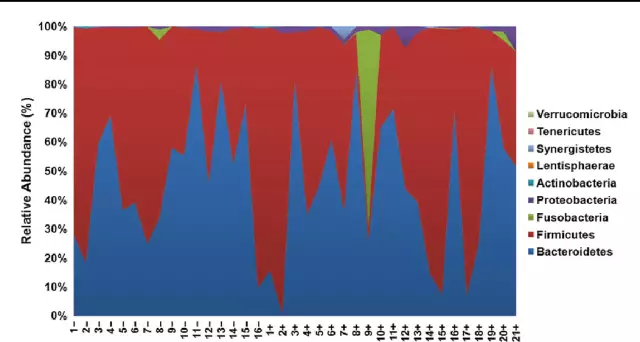- Author Rachel Wainwright wainwright@abchealthonline.com.
- Public 2023-12-15 07:39.
- Last modified 2025-11-02 20:14.
Diet for dysbiosis

Dysbacteriosis is a very unpleasant phenomenon that can accompany as well as aggravate the course of various diseases of the gastrointestinal tract. The main symptoms of dysbiosis are abdominal pain, fatigue, flatulence, bloating, allergic reactions, diarrhea or constipation.
In addition to treatment with medication, patients must also adhere to a diet for intestinal dysbiosis.
Reasons for the development of dysbiosis
The intestine has its own microflora - some bacteria (lactobacilli, bifidobacteria and others) take part in the processes of food processing, while others are represented by conditionally pathogenic flora, that is, they interfere with the processes of digestion. If there is a balance between these bacteria, the human body functions normally, but if good bacteria die, and opportunistic bacteria begin to multiply vigorously, dysbiosis develops.
Most often, dysbiosis develops due to:
- Antibiotic treatment;
- Eating disorders;
- Severe diseases in the gastrointestinal tract;
- Lack of vitamins;
- Inadequate diet.
Diet menu for intestinal dysbiosis
The diet of patients with dysbiosis is significantly influenced by the causes of the onset of the disease, therefore, below are general recommendations for a diet with dysbiosis.
Prohibited Products:
- Any foods that induce fermentation;
- Raw vegetables;
- Sour berries and fruits;
- Sorrel, spinach;
- Vegetables containing a lot of essential oils (radish, radish, onion, garlic);
- Mushrooms;
- Hot spices and seasonings;
- Smoked products;
- Marinades;
- Extremely cold dishes;
- Sweets.
If there is a tendency to constipation, you should also exclude strong fish and meat broths, offal or other foods that contain a lot of cholesterol from the diet.
The following products are allowed:
- Boiled vegetables;
- Lean fish and meat;
- Rosehip broth, jelly, tea;
- Bran bread (white bread is not recommended);
- Vegetable oils;
- Dairy products;
- Porridge (oatmeal, buckwheat, wheat);
- Eggs;
- Blueberries.

If constipation is observed, the diet for intestinal dysbiosis should contain many mechanical and chemical substances that stimulate the motor function of the intestine. It is necessary to exclude from the diet dishes that enhance the processes of fermentation and putrefaction in the intestine, containing substances that irritate the liver, stimulate the secretion of the stomach and pancreas, and bile secretion.
Food is allowed to be steamed, boiled or baked, preferably without chopping the food.
Sample menu during constipation:
- First breakfast: boiled fish or soft-boiled eggs, buckwheat and tea with one spoon of sugar.
- Second breakfast: 250 milliliters of juice or one apple, one teaspoon of natural honey, which must be quickly absorbed in the mouth.
- Lunch: boiled chicken and vegetarian soup with potatoes, boiled potatoes, carrots and beets, dried fruit compote.
- Afternoon snack: salad of grated carrots or beetroot puree, rosehip broth.
- Dinner: cottage cheese pudding or just homemade cottage cheese, boiled vegetables, tea.
- Before bedtime: kefir.
Throughout the day, you can eat rye bread or bran bread (150 grams) and sugar in the amount of one tablespoon. Of the fats, it is allowed to use one tablespoon of vegetable oil and one teaspoon of butter.
A diet for intestinal dysbiosis in children excludes any fried, spicy, smoked and fatty foods from the child's diet. It is also forbidden to eat a lot of sweets, which, as a rule, is difficult for children.
There are three rules to keep in mind when feeding a baby:
- It is necessary to introduce a regimen of meals, thus eliminating frequent snacks;
- For better assimilation, food should be warm;
- The diet should take into account the age of the child.
Found a mistake in the text? Select it and press Ctrl + Enter.






